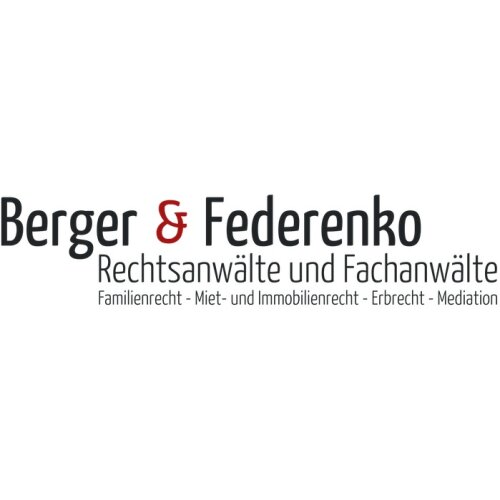Best Faith-Based Law Lawyers in Germany
Share your needs with us, get contacted by law firms.
Free. Takes 2 min.
Or refine your search by selecting a city:
List of the best lawyers in Germany
About Faith-Based Law in Germany
Faith-Based Law in Germany can be a complex area as it intersects with both private law and public law. It primarily involves the personal status laws that govern religious communities and their members, as well as laws concerning the operation of religious bodies within Germany. Given Germany's diverse society, multiple religious communities exist, each operating under specific legal considerations. The most prominent among these are Christian denominations, Islam, and Judaism. Faith-Based Law may cover topics such as marriage, divorce, inheritance, education, and religious freedom, but it is subject to the broader framework of German secular law, which ensures religious practices do not contravene the constitution.
Why You May Need a Lawyer
Individuals may seek legal advice in Faith-Based Law for numerous reasons. Common situations include disputes arising in religious marriages or divorces, issues around the inheritance within religious customs, and the need for legal documentation validating religious practices. Additionally, legal clarification might be necessary when starting a religious organization to ensure compliance with both religious laws and German state laws. When conflicts arise between religious laws and civil laws, expert legal advice is crucial to navigate these potentially contentious situations.
Local Laws Overview
Germany's Basic Law (Grundgesetz) ensures freedom of religion, which is pivotal to Faith-Based Law. This constitutional right allows people to practice their religion freely, but it also ensures that faith-based practices do not undermine public order and law. German law mandates that secular and religious laws coexist, emphasizing freedom from religious coercion. Furthermore, religious entities must register as official organizations to conduct business legally, and religious education in schools is also heavily regulated to respect both religious freedom and state curricula. Marriage and family law typically fall under civil jurisdiction, although religious components can be acknowledged during proceedings.
Frequently Asked Questions
What is Faith-Based Law?
Faith-Based Law refers to legal matters that involve religious principles within the framework of the larger legal system. In Germany, it primarily deals with the legal status and rights of religious organizations and the laws affecting individuals in their religious context.
Does German law recognize religious marriages?
Yes, religious marriages are recognized, but they must also be registered as civil unions to be legally binding in Germany. The civil registration is necessary for legal recognition regarding spousal rights, property, and parentage.
Can religious laws override German civil laws?
Religious laws cannot override German civil laws. While religious practices are respected, they must comply with national laws, particularly regarding fundamental rights and freedoms.
How does one start a religious organization in Germany?
To start a religious organization, one must register it according to civil law procedures. This usually involves drafting statutes, defining purposes consistent with the legal framework, and formal registration with relevant authorities as a registered association (e.V.) or another recognized legal form.
What are the rights of religious communities under German law?
Religious communities have the right to self-administration, practice, and public worship. However, they must adhere to public laws, such as those related to labor laws and anti-discrimination policies.
Can religious beliefs exempt me from following specific laws?
No, religious beliefs generally do not provide exemptions from following secular laws. The secular legal system prevails in ensuring public order, safety, and rights.
Are religious divorces recognized in Germany?
Religious divorces may be acknowledged culturally or religiously, but a civil divorce must be processed through the German legal system for it to be legally recognized.
What role do religious courts play in Germany?
Religious courts may offer mediation or resolution based on religious laws within communities, but their decisions are not enforceable under German law. Civil courts have the ultimate jurisdiction on legal matters.
How is religious freedom protected in Germany?
The Grundgesetz (Basic Law) protects religious freedom, stipulating that all individuals have the right to practice their faith freely without coercion, aligning with international human rights standards.
Can I seek legal aid for Faith-Based Law issues?
Yes, legal aid services are available for individuals requiring assistance, especially if they cannot afford private legal representation. Individuals can approach local legal aid offices or seek guidance from legal professionals or religious organizations.
Additional Resources
For more comprehensive support, consider reaching out to the German Federal Ministry for Family Affairs, Senior Citizens, Women and Youth (BMFSFJ), which often addresses matters involving religious communities. Religious organizations themselves can also be valuable resources, offering guidance on compliance with both religious and civil laws.
Non-governmental organizations like the Central Council of Muslims in Germany (ZMD) or the German Bishops' Conference provide resources and support for individuals navigating religious law situations. Additionally, legal advice can be sought from entities such as the German Bar Association or private legal firms specializing in religious or family law.
Next Steps
If you believe you need legal advice related to Faith-Based Law, consider reaching out to a legal professional who specializes in religious or family law. Research and select a lawyer experienced with the specific religious and legal intersections present in your case. Schedule a consultation to discuss your situation, goals, and any potential actions.
Gather all relevant information, including documentation related to your faith-based and legal concerns, to aid your legal consultation. Taking these preparatory steps ensures you have a clearer understanding and can articulate your needs effectively when seeking legal assistance.
Lawzana helps you find the best lawyers and law firms in Germany through a curated and pre-screened list of qualified legal professionals. Our platform offers rankings and detailed profiles of attorneys and law firms, allowing you to compare based on practice areas, including Faith-Based Law, experience, and client feedback.
Each profile includes a description of the firm's areas of practice, client reviews, team members and partners, year of establishment, spoken languages, office locations, contact information, social media presence, and any published articles or resources. Most firms on our platform speak English and are experienced in both local and international legal matters.
Get a quote from top-rated law firms in Germany — quickly, securely, and without unnecessary hassle.
Disclaimer:
The information provided on this page is for general informational purposes only and does not constitute legal advice. While we strive to ensure the accuracy and relevance of the content, legal information may change over time, and interpretations of the law can vary. You should always consult with a qualified legal professional for advice specific to your situation.
We disclaim all liability for actions taken or not taken based on the content of this page. If you believe any information is incorrect or outdated, please contact us, and we will review and update it where appropriate.
Browse faith-based law law firms by city in Germany
Refine your search by selecting a city.
















